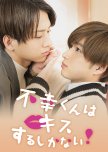
Sr. Azarado Não Tem Escolha Senão Beijar!
1 pessoas acharam esta resenha útil
Esta resenha pode conter spoilers
"Mr Unlucky Has No Choice but to Kiss" is a series that has both a title that is too long and episodes that are too short.Or maybe the episodes are just long enough -- long enough to develop a light-hearted story that makes us fall in love with the main characters and get to know the side characters. Dragging it out would not have helped, in my opinion.
This is what makes the show outstanding:
* The acting for Fukuhara's character is on point. I love how the actor can go from fake high-pitched cuteness when covering up his bad luck to real joy when something goes right, to his inner monologues complaining about his bad luck, to his real self when talking to Shinomiya.
* I like how the professor's lectures fit into the developing relationship. Also, from what I know of psychology, the theories presented are actual theories.
* It is astounding how the people working on this show have developed the supporting characters so well that I feel like I know them, even though they get very little screen time.
* The attention to detail in both the acting and the sets makes this show worth watching more than once (or twice. Or three times.)
* I am also glad that the issue of consent is so prominent in the story. (Especially as it's a point of concern in some other BLs.) Not only is it discussed several times, but the characters follow through to the end -- even to the frustration of the character who said no. The sudden kiss in episode 1 is also discussed later. (So, actually, the title is wrong. Fukuhara Kouta does have a choice to kiss!)
I also love how they showed that Fukuhara with his bouts of bad luck and Shinomiya with his incredible good luck both stand apart from the people around them. Now that they have found their counterpart who can bring balance to their lives, they will be able to open up to others and live as normal people among them.
I must admit that the nature in the background always confuses me a bit, as the story is set in April, but the nature looks like autumn -- but that might be because the whole colour palette tends towards brown and orange?
All in all, I highly recommend this series. It's fluffy and sweet, something nice to watch when you need a pick-me-up.
Esta resenha foi útil para você?
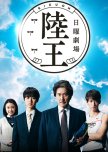
Esta resenha pode conter spoilers
The drama's main theme is a small, declining business with a tradition of 100 years that fights against financial pressures, the bank, a behemoth of a business rival etc. etc. There are some earnest speeches with a lot of pathos and "ganbarimasu" -- I feel as if every main character has a similar story of failure (a patent that has not been picked up, a declining business, failed interviews, sports injuries) and it's a story about being the underdog who takes second chances they don't actually have.
It's very David ("heart and soul", the people are what's important, hard work and tenacity makes you successful) versus Goliath (money won't make you happy and shouldn't be your goal in business life), and the general outcome is quite predictable.
The acting was top-notch, and the overall quality great; even after just a few minutes of the first episode I started to care about the little tabi factory and its people, which made me watch the entire thing. Nevertheless, I found that the episodes were structured too similarly, so they got a bit repetetive, with one or two main obstacles, that are solved during the episode, and at the end there's a joyful "We made it", at times with an added a glimpse of the next problem. There were about three musical pieces that were mostly uplifting in nature, which also got a bit boring.
Something I liked is that there were more people in their fifties than younger characters.
I was annoyed by the implicit misogyny -- none of the female characters had any role but to say supporting things to the men; anything that pushed the plot forward was done by men. And, when the older son doesn't want to inherit the business, nobody even asks if maybe the daughter might want to?
One thing that I found rather unrealistic:
A person, who invents a whole new material and builds the machine to produce it with his own hands, and then holds a patent -- wouldn't he rigorously test his invention early on, to understand which influence all of the variables of production have? It seems that after Iiyama had invented one working verson procedure, he called it a day?
(Also, a mechanical engineering, material engineering and electrical engineering are different fields of expertise! Does Daichi have three degrees?)
I was also some other plot points I found a bit strange. For example: There's a fire, and a machine is destroyed -- and there's no insurance? Not even a small one? Also, why do neither Iiyama nor Miyazawa ever try to negotiate when they get offers they don't want to take -- only in the second to last episode Miyazawa gives a counter offer.
All in all, it was entertaining, and I'm glad to have watched an example of the dramas based on the successful Japanese "business novel" genre. If I do watch another one, then maybe a story by another author though.
Esta resenha foi útil para você?

Esta resenha pode conter spoilers
pure crack
Are you familiar with the term "crack fic" from fan fiction? This is like that -- as if the writer asked: what are the most common tropes for BL stories to get two guys together, and how can I put all of them in one show?Here's some of the tropes:
forced cohabitation
only one bed
tutor -- student
a fujoshi
a love rival who makes one of them realize his feelings
caring for the ill love interest
sharing food
childhood bully to lover
gay for you
This show is silly, with intentionally exaggerated acting (bordering on slapstick) and camera work, and no plot besides the aforementioned tropes.
If you are not a fan of silliness and suggestive scenes that never actually get anywhere, then this is not for you. If, on the other hand, you are willing to laugh at your own love of BL and are also a fan of silly slapsticky situations, then what are you waiting for?
Also, it might be of interest to know that this is all about the phase BEFORE one of them finally realizes the attraction to the other, so there's no actual relationship here.
In a traditional broadcast setting, this show would fit perfectly at the end of a more serious BL drama.
Esta resenha foi útil para você?
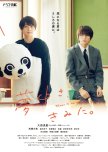
"The world is complicated and ambiguous. In this world, we mix and connect."
Have you ever looked at a Wimmelbilderbuch? These are books for children, where every page depicts a scene -- a market, a school, a street, a park -- with lots of people. You look at each person and discover a bit about them. Then you turn the page, and there's a new scene. Sometimes you'll meet some of the same people, and can continue their stories. Sometimes, there are new people. On some of these pages, the little people meet (or miss each other by seconds), which changes their course for the next pages. At the end, you close the book, but the stories about the people will never be finished.This show is much like that. We get to see episodes of the lives of several teenagers, glimpse into the wide universe of their thoughts and emotions, turn the page -- and someting new might happen. That something new is more often than not hilariously surreal in this show, but -- like in other Japanese Dramas -- deeper than it seems at first glance.
Release all your preconceptions about how dramas are supposed to work, and look closely.
Look at another person, really look beyond what's immediately visible; listen to them, and you may find that you are Captivated, by them.
"Even so, you'd throw yourself into the world, in secret, with all your might, in an ambiguous form, in a complicated straight line."
Esta resenha foi útil para você?

The target audience is definitely much younger than me, but I liked it.
Technical aspects of the production were fine. Overall, the acting was good, especially since the actors are all really young. Directing was fine also -- I always have an eye on how ensemble scenes are done, and I did not notice anything missing here.
There are quite a lot of songs in the series, which is appropriate, since it's about a band -- not too many (and that's coming from me, who thinks that there's too much singing in Disney movies), and all of them fitting the band's general vibe and the plot.
Regarding the plot, it is a slow burn with lots of pining, and I tend to love this trope. Yes, it's a bit ridiculous at times, and also a bit cheesy, but that makes the series so charming. Even though some more serious issues are addressed, it's never high-stakes for the audience.
A lot of the good tropes are used liberally, some are there just to be subverted (an episode at the beach, but the young people get only five minutes to actually enjoy it?) -- and there are none of the trope I hate (e.g. miscommunication because some character is lying, love triangles, traumatic childhood experiences, jealous female characters...).
I also loved that there's so much time dedicated to the bandmates' friendship and the highs and lows they go through as the school year progresses. They are all young boys who enjoy life, and are not ashamed to act silly when they feel like it.
The parents also got some character development, and enough time to show it.
There really only two very minor points that could have been better:
a) I wish there were more female roles. I know it's a BL, and BLs have to have a majority of male characters, but why not have a girl in the band? Or a female Kajorn? Or female MCs? Or a female Yak? (Though, I admit, the last one is maybe a bit more difficult.)
b) I would have liked to see a bit more story for Tinn, whose main role is to support Gun, his love interest. He does have his own insecurities, his own questions about his future -- it's all already there, just underdeveloped and glossed over.
One last thing, because I waited for it but it never came: There is absolutely none of that old and tired top/bottom-dynamic in this show! None of the boys have any characteristics that trope would demand (difference in age, status, experience, body type etc.), none of the "pushy top" and "reluctant bottom", their body language and whole demeanor are always "typical boy" and touches are very much mutual and equal in reciprocation. I hope we'll get to see more of this kind of relationship dynamic in future Thai BL shows.
(They even make fun of the trope at the end when they talk about ship names!)
So that was a very nice surprise.
All in all, the show is light-hearted and funny, even silly at times, with great friendships -- it made me smile throughout the whole series. So I recommend it as something to watch on gloomy days. Characters don't take themselves too serious, and the audience should do the same.
Esta resenha foi útil para você?
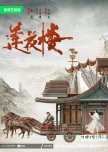
Esta resenha pode conter spoilers
Excellent drama with one flaw
THE STORY:I started this thinking that we'd get to see detective stories, where I could solve cases together with the heroes. The cases were, although interesting, not of that sort. They all made sense, but the audience often only got to see the clues at the time Li Lianhua or Fang Duobing revealed them to their co-characters. The cases themselves were overshadowed by the overarching plot relatively early, so for me, they did not have too much merit by themselves, and only served as a vehicle to move the story forward.
The overarching story wasn't that complicated, we got to guess the main villain quite early, and some of the plot twists weren't that twisty for me.
(Also, the main plot point -- evil people from a defeated foreign country try to overthrow the mighty and just and overall better [China] and fail -- is typical Chinese nationalist fare.)
What makes the story interesting, is the journey of Li Lianhua, both in the past, which is revealed to us in increments, and in the present -- Li Lianhua, who is terminally ill and is pulled into the Jianhu after ten years of solitude, whose journey is one of finding closure, of forgiving or avenging, of finding meaning in life and death.
A plus, for me, is also that the series has little romance -- most of it finds it conclusion within three episodes or so around episode 20 (they decide their romance will stay in the past only). Unfortunately, most female characters' motivation still circles around love, more on that see below.
The story unfolds over 36 episodes, which never drag or feel rushed. The series kept my interest throughout -- the pacing was always just right.
THE CHARACTERS:
Li Lianhua is a wonderfully human character. He is flawed, he lies, he deceives but still seems to be a person who has his values he lives by. He is a miracle doctor and a horrible cook. He is someone who pushes others away, and it's never quite clear if it's to protect the other person or himself. He is selfish in his last decision, and at the same time sacrifices his life (essence) for others over and over again. Li Lianhua is world-weary but can still find solace in the little joys in life and seems to believe that most people are ultimately good.
Li Xiangyi was young and inexperienced. He trusted wholeheartedly -- but also judged hard. He thought he was the most important person in the sect -- and died because of it.
I also loved the other two main characters -- loved their banter, of course. They both had their distinct personalities and unique goals. Fang Doubing and Di Feisheng had good character development -- more time to show their personalities and their inner life would have been even better.
The one thing that irked me for the most part of the series was the portrayal of the female characters. Their motivations mainly circled around "love" (or a version thereof), and usually, they had no agency without a man. Let's look at the four most prominent women:
Jiao Li Qiao: Her motivation for anything is to get Di Feisheng as her husband. That's it.
Qiao Wan Mian: She is important as the past love interest of Li Xiangyi, who waited for ten years for him. Later, she gets a bit more agency, but it remains half-hearted. Has she left Zijin or not? Why does she take his Sect leader token but does not take on the role herself? (He is obviously still the sect leader later.)
Master He (Fang doubig's mother): She's the only woman without an interest in pursuing another man; the only one who is shown with significant skills who can contribute to the fight. She is also the only married woman, and the only middle-aged woman, so it's probably just that she's "too old" to be a potential love interest who can be heroically disregarded.
The princess: Her interest in marrying Fang Doubing is somewhat understandable -- as a princess she lives a highly regulated life, and probably knows that the only chance to get a bit of freedom is as a married woman. (Of course, her interest has to take a backseat next to her fiancé's desires.)
There's also the young girl who we first meet when she disguises herself as a man -- she could have easily been a cunning woman with a network of informants or a vast library. But no! She always gets her information from her grandfather and she is allowed to bring Li Lianhua to her brother for treatment.
That's enough of a rant for this review. Let's close with another excellent aspect:
THE ACTING:
I did not find one actor unsatisfying. The minor characters were all right throughout.
All three main characters were portrayed incredibly well. Especially Chen Yi (Li Lianhua) who needed to show his multi-layered personality without words had excellent micro-expressions. Di Feisheng is probably more interesting than the script itself has provided because Xiao Xun Yao manages to hint for underlying emotions of his character from the first second we get to see him on screen.
And a special mention has to go to Rain Wang (Jiao Li Qiao), who, despite her single-trait character, shows how chillingly deranged Jiao Li Qiao has become over the course of the series.
OVERALL:
This is, despite the one flaw, a series that tells a story about friendship, betrayal and revenge -- and a man who just wants to have a quiet death.
Recommended!
Esta resenha foi útil para você?
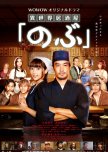
Making the world a better place by lovingly preparing one dish at a time.
There's not much plot, apart from the last two episodes. But that doesn't matter, it's just about people cooking, serving and eating different, mostly Japanese dishes.Really, if you're waiting for an explanation for why there's a connection between the worlds, or how the owner can buy things in our world with currency from the other world, you'll be disappointed.
The whole thing is a thinly disguised food appreciation show, with some loveable characters who do the appreciation.
I was reminded of Wakako Zake.
Bonus points for the German, the texts that were readable had actually decent German. (If I wanted to nitpick, I'd mention that the Fraktur font needs a "long s" at the beginning and in the middle of a syllable instead of the "round s" (only used at the end of a syllable), but I won't.)
The isekai the tavern connects to has elements of different centuries -- for example: references to a northern God whose name sounds a lot like "Oden" (early middle ages, maybe around 6th cent.) or the buildings in the town (late middle ages to early renaissance, so ca. 14th to 16th cent.) or the clothing (somewhere in the 17th and 18th cent.) or the mention of Kartoffeln as main staple of food (late 18th and 19th cent.) and the Fraktur font (mainly late 19th and early 20th cent.) -- so it's not medieval, but firmly in the realm of fantasy.
If you just want to see how some Japanese-style food can make a society a bit better, and want to relax watching people enjoy this food while bickering a bit, then this might be for you.
Esta resenha foi útil para você?
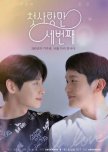
Esta resenha pode conter spoilers
Who is it you love?
Do you really love the person as they are or is it just an image you have made of that person in your head?What I liked:
* I loved the development of the author's character. He went from very much self-assured, narcissistic, and someone who is sure that his love story will finally come to the end he wished for three hundred years ago to a very much shocked, insecure person whose world has been turned upside down, and at last to someone who is starting to learn that there are always two people in a relationship with their own thoughts and feelings.
* The author's actor showed all of these emotions well, sometimes dramatically, and completely unashamed to be seen. I can hardly believe that this was Jin Gun's first drama.
* In contrast to the author, Ha Yeon knows what he wants very well and he is not afraid to go for it. This makes for an interesting dynamic.
What I did not like:
* I wish we would have got to see more of the second life. It was always flashbacks to the same scene. How long had they known each other then? How did they meet? What was their relationship like?
I think if we knew more about this time, the question the modern Ha Yeon asks -- Which Ha Yeon do you love? -- would have made more sense to more people in the audience.
I suppose that, in both of their lives, they did not have much time together in mundane situations (it was obviously a time of strife and struggle in their second life, and in the first they did not even get to speak as someone else than slave and lady), and that's why Yeon Seok had this image of "Ha Yeon" of someone who is not goofy, but rather refined -- who knows how the first two Ha Yeons really were?
Is it love if you only know the other person's facade that they show to the public?
It would have been nice if the show had more time to explore this question in greater depth.
Still, the story we get to see is cute, well acted, and we get to see some character development.
Recommended!
Esta resenha foi útil para você?

Things I liked most:
* The female characters! Although they were still in the minority, they were fantastic! The two main female characters were an equal part of the cast -- in most cases the female forensic doctor was the one who found the deciding clue, even. Both were shown as professionals, with interesting personal lives, own ambitions and well-rounded personalities.
* The team! We get to know all five (hm, six) people of the UDI well, and how they learn and grow together. They start as distant, even uncomfortable colleagues -- and in the end, they work as a well-integrated team. Some of them get some character development, some don't really need it.
* The supporting cast! Even they got a personality, some are more mysterious, some antagonistic, some familial. All of them clearly have their own motivations and goals.
* The acting! The directing! The soundtrack!
* No Romance! Well, over the course of one or two episodes, the male part-timer wonders if the female lead might be interested in him, and it seems he wouldn't have rejected any advances -- but! That fizzles out and is never even thought about again.
(Although, as I read through the other reviews, I see Orangevine's who states that "There is also a love triangle (with the caveat that one must be well-versed in Japanese romance tropes to spot it)". I'm obviously not well-versed, so I don't see it.)
* Minimal gore! We see blood, contusions, discoloration of the skin, some wounds, the occasional part of an organ preserved in formalin. Faces of the deceased are never disfigured, there are a few scenes where we see how the scalpel starts to cut, but never any opened bodies or any inner body parts while the autopsy is in progress.
All in all, it's remarkably respectful of the dead (compared to US productions) and there's never any kind of voyeurism.
* A fascinating insight into Japanese culture! Concerning death, and how the deceased and those who have contact with them are regarded and what it means for the politics around them.
* Last but not least: The cases! Not every case is a crime, but they are all interesting. The first one is noticably from before CoViD. The seventh had me in tears, that one hit close to home for me. The overarching plot was also intense, and was the main focus of the last three or so episodes, and tied all the personalities and their development together.
Esta resenha foi útil para você?

All in all, it did not wholly deliver on its promise.
The premise I liked, four young people who have to come to a decision and their own standing point regarding their position towards platonic and romantic relationships -- and issues of belonging to a group versus being who you are. Even the love triangle made sense within these topics.
The execution, though, is stilted and at times too slow.
These are definitely directing choices, not the problems of the actors -- as soon as they get to do something, they start to shine.
For example, I don't understand why the actors stand right in front of each other in most conversations, with their arms hanging down without movement (and the whole drama is conversation-heavy) -- alternatively, they talk while walking next to each other at a snail's pace. I suppose the director wanted to convey some kind of awkwardness -- which is a good idea, since the characters definitely don't feel comfortable for most of the time, but it just gets boring after a while.
Also, the characters (with the exception of Namgoong) all have similar mannerisms (or, if I want to be a bit mean, the same mannerisms) -- including the teacher, which I mistook for another student in several scenes.
There were also some minor issues:
* At times, the background music did not quite fit the mood -- I'm also not a fan of the "plink-plink"-kind of music.
* The scene with the adult toys in the beginning was never resolved, and did not fit in with the rest of the story.
* I could have done without the kiss at the end -- it feels as if the writers or the director said: Oh, the audience also wants a kiss, so lets add it somewhere. A hug or some light cuddling, or even sitting very close to each other would have fit the overall mood better.
* I'm also not too sure about the female character, but since she had her own story arc and character development, I'll let it slide.
The plot itself, with its theme of exploration and the awkwardness of navigating relationships in adolescenece, is fine, and surely of interest to many. It's just that the way the series is brought to the screen cannot convey all the depth and the emotion it wanted.
Maybe if the creators had been clearer of the intended audience and made some bolder choices for directing according to that, it would have been more on point.
Overall, I found it okay to watch, but not worth a second time.
Esta resenha foi útil para você?

Why I gave ten points:
* The main character was quirky, energetic and enthusiastic, without being annoying. These traits were balanced with a grounding earnestness to understand and to grow.
* Overall, the show has a positive outlook on life and work, it is a Japanese-typical "ganbarimasu"-type of story. This, too, is balanced with scenes of failure, of darkness that lives within people, of sadness and introspection. Not everything is roses here, just like in Real Life.
* During the unfolding events, we get to grow close all of the characters, mangaka and editors alike. Some are more multi-faceted than others, but they all have their individual characteristics. Many of the characters get some chance to grow, sometimes in subtle ways -- which is an accomplishment to show for so many characters in such a short time.
* I liked that different sub-storylines connected to others, sometimes just for a few moments, sometimes longer.
* No Romance! It's about the characters and their journey, their interactions as colleagues and/or as editor-and-mangaka. (There is one scene when one character sends some glances in another character's direction which could be seen as some kind of romantic interest, but that's never acknowledged, and it's only the one time.)
* The struggles in the storylines were all either internal struggles of a person or issues of the publishing industry. There were no external conflicts, no "evil" people -- in short, no unnecessary drama.
* The length of the drama was just right for the storyline. It doesn't need more, but if it was shorter, the atmosphere would probably suffer.
All in all, I recommend the series, which has an overall optimistic tone balanced by darker and more sombre parts, which make a well-rounded story, with a small plot twist in the last episode.
[This is a very slightly edited version of my review on Viki.]
Esta resenha foi útil para você?

This show is NOT: A romance drama. And NOT: A baseball drama.
Why not a baseball drama? Well... It's about the time between seasons, so there can't be any games played. We actually see only bits of a game at the start and pieces of two practice games. That's all.This drama is more about the politics and management side of professional baseball in South Korea. If you are not a fan of strategic machinations and emotional development of characters, you might want to give this show a miss.
I liked that the drama does not insult its audience's intelligence. It does not spell out every little thing, it does not repeat the same information endlessly, and there are several times when little throwaway comments or actions make an impact in later episodes. This is not a drama to watch while doing other things.
I especially liked how realistic the actions of (almost) every character was. In systemic coaching (which I'm starting to learn for professional reasons), two of the main theses are: "Every person's actions make sense for that one person within the current situation, always." and "Every decision has a prize and a price."
Even if some things are only hinted at, or not fully explained, there's this feeling that every character has their own motivation for their decisions. There is no pure good or evil, just people.
The actors did a terrific job in bringing their characters to life.
I'm also glad that the writer did not try to force a romance into the plot. The dynamics between the two main characters were of the profesional sort, maybe with a hint of a possible friendship, but nothing more.
And one last thing I loved is the ending. This is not a 100% happy, team-spirit-has-overcome-everything ending, but an ending which rather shows that even though you might have grown, things will probably not work out like you would have wanted them to. For me, that was absolutely satisfying.
[this is an updated version of the review I posted on Viki]
Esta resenha foi útil para você?
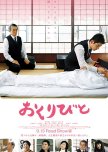
Esta resenha pode conter spoilers
The story, just like Death itself, is quite simple and could be told in a few sentences.What makes this movie amazing is how script, settings, nature, music and acting make a whole that is more than the sum of it parts.
The script itself - a journey to self-discovery, a story about leaving and letting go --has some rearkable lines that could sound cheesy but the way they are spoken, feel like profound truths of life. The acting makes as much use of silence as of speaking. The ritual of nokan has few words spoken, but the body language of the nokanshi and the bereaved speak volumes.
The music with it's leitmotif of "the Traveller" bridges the gap between what we see and what we feel.
And nature itself follows the flow of the story. The ending of the dream happens in late autumn, the winter storms accompany the lowest point of Daigo's lfe. Spring brings new hope and new life.
Similarly, the houses tell the stories of their owners: The bath house is run-down but lovingly maintained, Daigo's house where his mother lived is full of her own life and the memories of Daigo's father, and last but not least, the Nokanshi's living space is full of green and flourishing plants.
All of this is done with lovingly attention to detail: The ritual itself, of course. But have you seen that when Daigo washes the bath house owner's body -- the bowl Daigo uses is one of the bath house's?
When so much of the movie relies on silences, on the music and on the settings themselves -- what use is a review that uses the written word? Go, watch for yourself and feel what you see and hear.
Esta resenha foi útil para você?
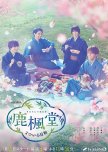
What is a family?
Six aspects I loved most:
* No romance! Yes, it feels like a BL at points, but it's not. This is about people who have found a place and people they belong to. If you consider all the families that are shown -- the four Rokuhoudou men, the chef, his daughter and the young man from the Italian lunch place, the brother and his patissier, and all these people who only appeared in one episode but found each other in the café -- none of these are what you think of when you first hear the word "family".
* The locations, the food, and the way both were filmed.
* Although this is a manga / anime adaptation, the producers made things look realistic -- no strange wigs, coloured contact lenses. The acting definitely shows the heritage, but it's not too over-the-top, and doesn't distract from the message at all.
* The intimacy between the four men in the café -- I loved that they don't shy away from expressing their feelings by touches, hugs, etc.
* As a bonus, they managed to include the Covid-pandemic as a plot point to underline the message on how integral their little family is to the Rokuhoudou guys.
* Nothing ever felt rushed in the story telling, it was slow where it should be without letting things drag. After all, this café is all about finding a place to enjoy good food, good drink and good company.
Overall, a lovely story about family, and where to find it, with a lot of tasty food.
Esta resenha foi útil para você?

Down-to-earth but with introspective tones
The cases as they are, are not that complicated, it is much more about the characters themselves, their story, their motivations and how they deal with grief and danger. There a quite a few scenes where it seems as if "nothing" is happening -- those scenes show the characters, what they think, how they (re)act. Sometimes theyare there for the atmosphere, to allow for some introspection.As such, the pacing can feel slow at times, but in my opinion, there is not one scene that's superfluous ar dragged out. Everything has its time.
This, and the fact that nothing is glittering or modern in this drama, make it exceptional. The main character is linving in a small neighbourhood in a house that doesn't even have an indoor toilet; the police in Shangta have their quarters in an old cinema, where there's no heating and the walls are crumbling. The whole town looks more or less run-down -- as do the actors. There are no airbrushed, beautiful people in colourful clothing here. Everything feels real (and very, very cold).
I love how down-to-earth the police are in this drama. While I certainly don't expect any real criticism of the system, the way the police officers make the best out of their limited ressources, how they grumble a bit about them but basically take them with a bit of humour; how they plod along and try to find the girl, but as humans, fail again and again -- this also makes the characters relatable.
And after the cases are closed, they all return to their daily lives; they live on as before, but something in them has changed.
Another point that I loved were the female characters, few of them as there were:
* The girl, of course. What a great actress! And what a strong and resourceful character! This is not a pitiable and helpless victim.
* The karaoke bar owner. She lost her family at an early age, is clearly jaded -- and still finds humanity and love in herself.
* And last but not least, the fire watcher ("bear lady"): She was beautiful in her love for the forest and the creatures living there, but was very realistic in her approach to life and death. She lived alone and was happy with that. She felt very solid and grounded.
One last mention goes to the music -- both the songs for the opening and closing credits are beautiful and fitting for the rest of the series.
[Cross-posted to Viki]
Esta resenha foi útil para você?

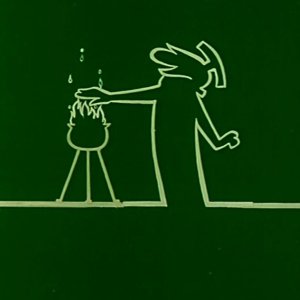
 4
4














